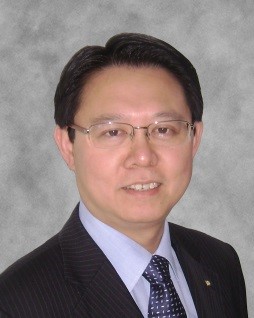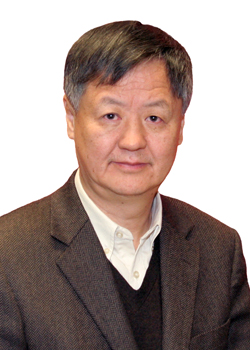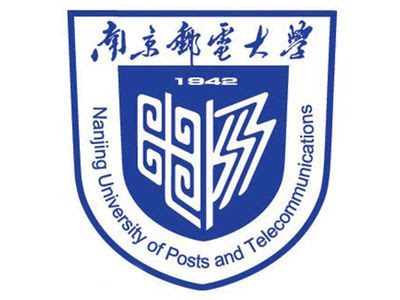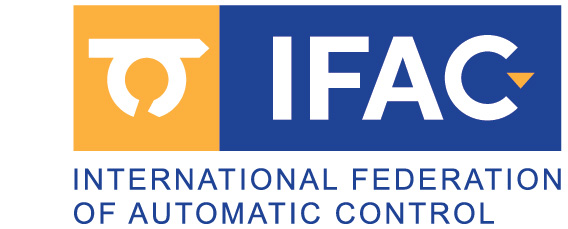Keynote Speakers
"Intelligent Control Based on Neurdynamic Optimization"
|
Professor Jun Wang |
AbstractNeurodynamic optimization play important roles intelligent control. In this talk, neurodynamic optimization approaches will be presented for in synthesis and realization of intelligent control systems. First, the robust pole assignment of linear control systems will be introduced based on neurodynamic optimization. Then, neurodynimics-based reference or command governor optimization will be delineated. Next, nonlinear and robust model predictive control based neurodynamic optimization will be discussed. Simulation and experimental results will also be shown to demonstrate the efficacy and performance of the proposed neurodynamics-based approaches for the intelligent control of various dynamic systems. |
Speaker biography
Jun Wang is the Chair Professor Computational Intelligence in the Department of Computer Science at City University of Hong Kong. Prior to this position, he held various academic positions at Dalian University of Technology, Case Western Reserve University, University of North Dakota, and the Chinese University of Hong Kong. He also held various short-term visiting positions at USAF Armstrong Laboratory, RIKEN Brain Science Institute, Dalian University of Technology, Huazhong University of Science and Technology, and Shanghai Jiao Tong University (Changjiang Chair Professor). He received a B.S. degree in electrical engineering and an M.S. degree in systems engineering from Dalian University of Technology and his Ph.D. degree in systems engineering from Case Western Reserve University. His current research interests include neural networks and their applications. He published over 200 journal papers, 15 book chapters, 11 edited books, and numerous conference papers in these areas. He is the Editor-in-Chief of the IEEE Transactions on Cybernetics. He also served as an Associate Editor of the IEEE Transactions on Neural Networks (1999-2009), IEEE Transactions on Cybernetics and its predecessor (2003-2013), and IEEE Transactions on Systems, Man, and Cybernetics – Part C (2002–2005), as a member of the editorial board of Neural Networks (2012-2014), editorial advisory board of International Journal of Neural Systems (2006-2013. He was an organizer of several international conferences such as the General Chair of the 13th International Conference on Neural Information Processing (2006), the 2008 IEEE World Congress on Computational Intelligence, the 25th International Conference on Neural Information Processing (2018), and a Program Chair of the IEEE International Conference on Systems, Man, and Cybernetics (2012). He is an IEEE Fellow, IAPR Fellow, CAAI Fellow, and an IEEE Systems, Man and Cybernetics Society Distinguished Lecturer (2017-2018), and was an IEEE Computational Intelligence Society Distinguished Lecturer (2010-2012, 2014-2016). In addition, he served as President of Asia Pacific Neural Network Assembly (APNNA) in 2006 and many organizations such as IEEE Fellow Committee; IEEE Computational Intelligence Society Awards Committee; IEEE Systems, Man, and Cybernetics Society Board of Governors, He is a recipient of an IEEE Transactions on Neural Networks Outstanding Paper Award and APNNA Outstanding Achievement Award in 2011, Neural Networks Pioneer Award from IEEE Computational Intelligence Society in 2014, among other distinctions.
"Switching in Complex Network Systems: A Control Engineering Perspective"
 Professor Xinghuo Yu, IEEE Fellow
Professor Xinghuo Yu, IEEE Fellow RMIT University, Melbourne, Australia |
AbstractMany real-world systems are of large-scale network nature, such as power grids and biological systems. A major challenge is how to deal with sheer size and complexity of these large-scale networked systems to deliver desirable and time-critical outcomes. Switching phenomena are common in complex network systems. Understanding the switching phenomena in complex network systems will help address significant industrial problems such as maintaining stability of smart grids with large number of intermittent renewable energy sources. |
Speaker biography
Professor Xinghuo Yu is Associate Deputy Vice-Chancellor and Distinguished Professor of RMIT University, Melbourne, Australia. He is also President of IEEE Industrial Electronics Society.
His main research areas are control systems engineering, intelligent and complex systems, and smart grids. He has served as an Associate Editor of IEEE Transactions on Automatic Control, IEEE Transactions on Industrial Electronics, IEEE Transactions on Industrial Informatics, and IEEE Transactions on Circuits and Systems I. He received a number of awards and honours for his contributions, including the 2018 M. A. Sargent Medal of Engineers Australia and the 2013 Dr.-Ing. Eugene Mittelmann Achievement Award of IEEE Industrial Electronics Society. He was named a Highly Cited Researcher by Thomson Reuters in 2015, 2016 and 2017. He is a Fellow of IEEE, Engineers Australia, Australian Computer Society, and Australian Institute of Company Directors.
"A Survey of Quantum Control Engineering"
 Professor Ian R. Petersen
Professor Ian R. PetersenResearch School of Engineering, The Australian National University |
AbstractThis talk will survey the area of quantum control engineering. It will discuss models for quantum systems using both the Schrodinger and Heisenberg pictures of quantum mechanics including finite level quantum systems and continuous linear quantum systems. It will also discuss the open loop quantum control of quantum systems including robust and learning based approaches. In addition, it will discuss closed loop approaches to quantum control including measurement based feedback control and quantum filtering along with coherent quantum feedback control in which the controller is also a quantum system. In the area of coherent control of quantum linear quantum systems, it will discuss quantum H - infinity control, quantum LQG control and coherent quantum observers and coherent quantum state estimation. |
Speaker biography
Ian R. Petersen was born in Victoria, Australia. He received a Ph.D in Electrical Engineering in 1984 from the University of Rochester. From 1983 to 1985 he was a Postdoctoral Fellow at the Australian National University. From 1985 until 2016 he was with UNSW Canberra where he was most recently a Scientia Professor and an Australian Research Council Laureate Fellow in the School of Engineering and Information Technology. He has previously been ARC Executive Director for Mathematics Information and Communications, Acting Deputy Vice-Chancellor Research for UNSW and an Australian Federation Fellow. From 2017 he has been a Professor in the Research School of Engineering at the Australian National University. He has served as an Associate Editor for the IEEE Transactions on Automatic Control, Systems and Control Letters, Automatica, IEEE Transactions on Control Systems Technology and SIAM Journal on Control and Optimization. Currently he is an Editor for Automatica. He is a fellow of IFAC, the IEEE and the Australian Academy of Science. His main research interests are in robust control theory, quantum control theory and stochastic control theory.










